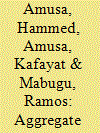| Srl | Item |
| 1 |
ID:
091702


|
|
|
|
|
| Publication |
2009.
|
| Summary/Abstract |
Electricity demand in South Africa has grown at a very rapid rate over the past decade. As part of reform initiatives to enhance long-term sustainability of the country's electricity industry, South Africa's authorities have in recent years sought to develop an electricity pricing framework that is cost reflective and forms the cornerstone of demand management schemes meant to foster changes in consumption behaviour and enhance efficiency in resource use. The effects of any pricing policy on aggregate electricity consumption will depend on a useful understanding of the factors that influence electricity demand, and the magnitude to which electricity demand responds to changes in such factors. In this context, this paper applies the bounds testing approach to cointegration within an autoregressive distributed lag framework to examine the aggregate demand for electricity in South Africa during the period 1960-2007. The results indicate that in the long run, income is the main determinant of electricity demand. With electricity prices having an insignificant effect on aggregate electricity demand, future pricing policies will need to ensure that electricity prices are cost reflective and enhance efficiency of electricity supply and use.
|
|
|
|
|
|
|
|
|
|
|
|
|
|
|
|
| 2 |
ID:
092823


|
|
|
|
|
| Publication |
2009.
|
| Summary/Abstract |
Three levels of analysis are used to track the channels by which South Africa and its people are impacted by an increase of oil prices, namely the macro-economic level, the meso-economic level and the micro-economic/household level. The paper uses an economy and energy integrated approach to quantify these different channels. The approach combines a household survey dataset and an input-output dataset to implement the models. Results indicate that the impacts on the macroeconomy are negative, with gross domestic product falling and the current account balance worsening. All of the industries falling into the high intensive oil - use group witness an increase of their input cost that is above the economy - wide average. The impact of doubling paraffin prices results in poor households in rural areas and among the "Black" population, in particular, witnessing an increase of their cost of living which is much higher than their corresponding highest expenditure quintile groups. An increase of transport fuel hits the richer households much harder. The distributional impacts of rising transport cost as a consequence of high oil and oil-products prices shows that median quintile expenditure groups observe the highest impact both in urban and rural areas and especially among the "Black" population.
|
|
|
|
|
|
|
|
|
|
|
|
|
|
|
|